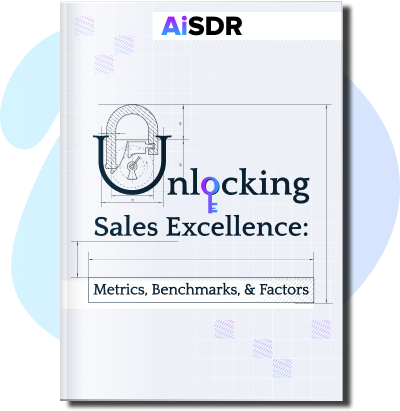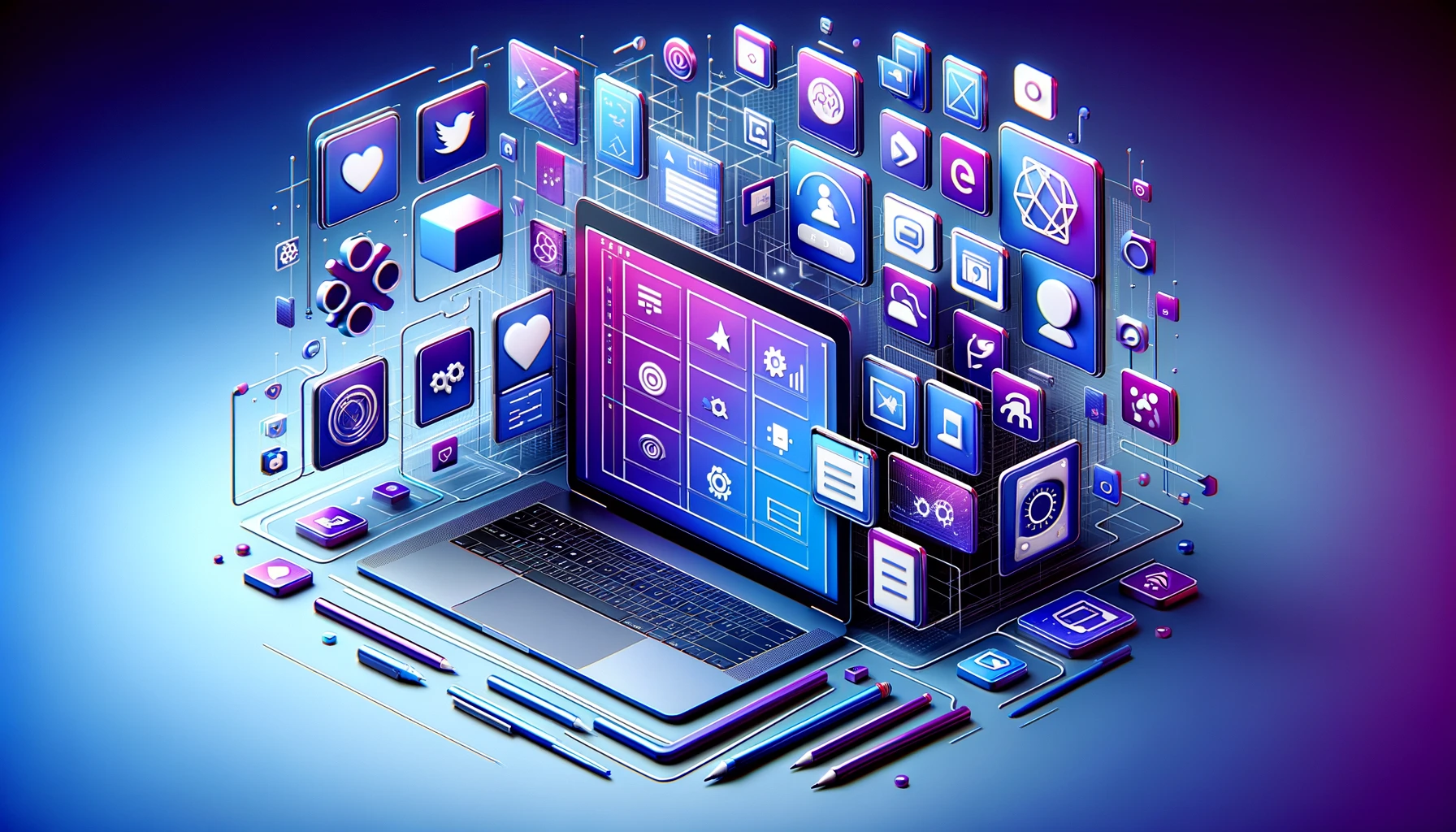Why Sales and Marketing Teams Should Embrace Generative AI
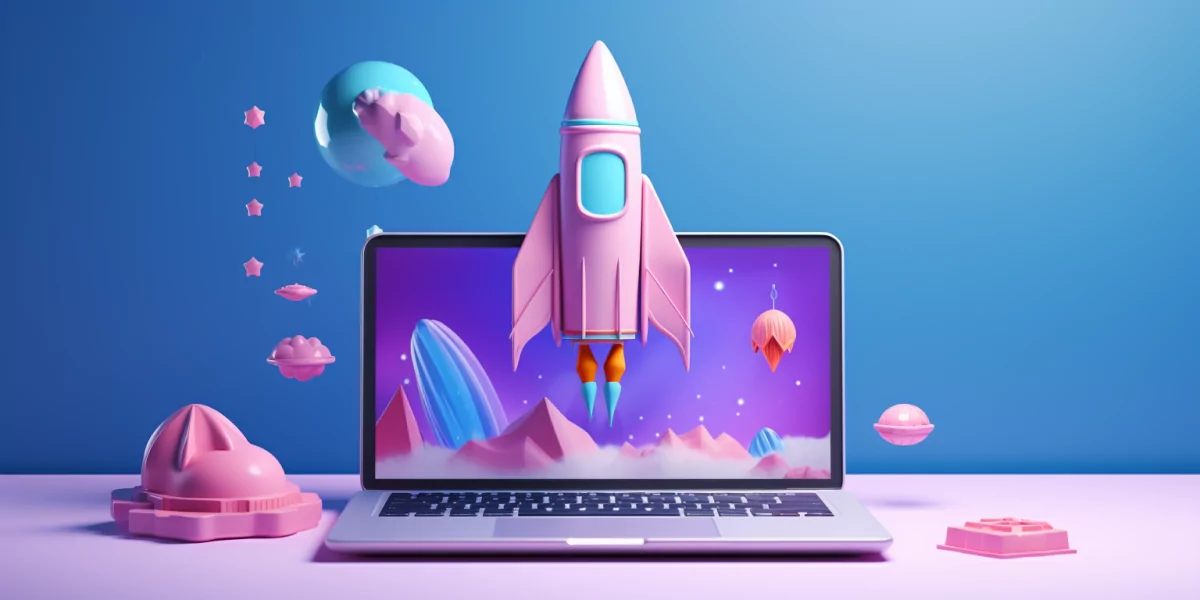
Join us as we dive into the reasons why Sales and Marketing that use AI will always be one step ahead than those ignoring it
If you were to browse any sales and marketing media, chances are you’d encounter information about generative AI in the first five minutes. This isn’t surprising at all — The release of ChatGPT brought a lot of attention to using AI tools for nurturing leads, lead generation, and other sales and marketing tasks.
All of this attention is warranted. Using generative AI in sales and marketing optimizes many routine work processes and lets specialists spend their time on more strategic tasks. In a survey by Salesforce of 6,000 top-performing sales professionals, 57% said they already used some AI sales tools to improve their productivity.
However, many professionals are still hesitant to introduce AI in sales and marketing due to misconceptions about AI tools or a lack of knowledge about how to make AI work for them.
This article discusses the top uses of AI in marketing and sales and provides strategies for how to get the most out of them.
Growth of generative AI
Artificial intelligence in sales and marketing has advanced enormously in the past year, transforming from a novel, unexplored technology to a full-fledged tool used daily by many specialists.
Here are some of the findings that give insight into AI’s evolving role in sales and marketing strategies:
- HubSpot reports that 85% of sales professionals surveyed said AI made their prospecting efforts more effective.
- In a recent Gartner survey, 53% out of 119 IT leaders whose teams are using GenAI tools beyond ChatGPT said they are using those for marketing and sales efforts.
- A survey of organizations using generative AI revealed that 46% mostly used generative AI for marketing and communication.
All of this data suggests that generative AI is more than just asking ChatGPT for marketing material.
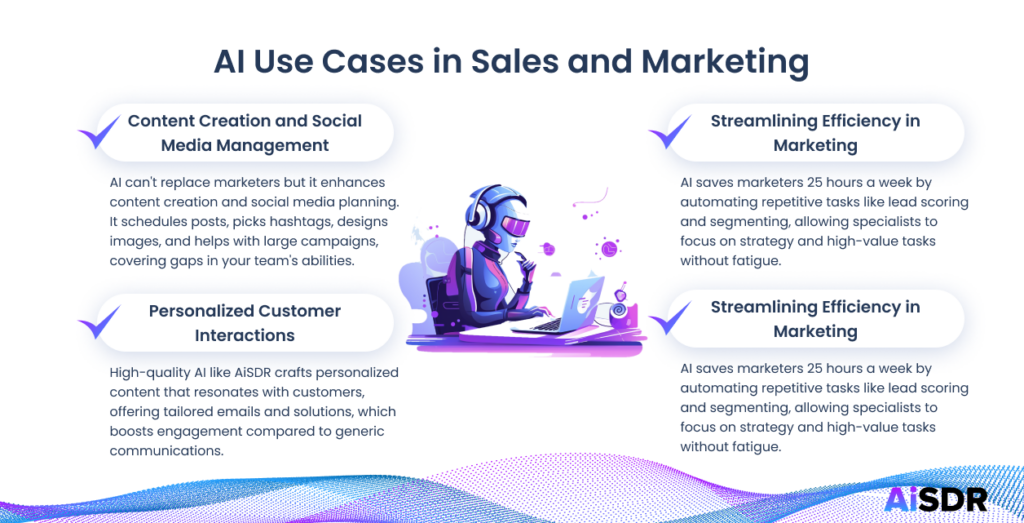
What tasks can AI perform?
AI comes in all shapes and sizes. Here’s a quick rundown of the variety of tasks AI can perform for sales and marketing:
- Pattern recognition: AI algorithms can analyze customer purchase history to detect what products particular customers would likely want next. That’s where product recommendations come in.
- Data classification: AI can learn to classify process-specific information. For example, AI can take in thousands of support tickets tagged with issues like “billing,” “account access,” and “shipping” and learn to accurately redirect and assign new tickets to those categories. A bit of fine-tuning and you can use AI for sales and marketing activities.
- Summarization: AI can ease the information overload that weighs on all teams. Whether it’s a long research report or an online article, AI can break down all the details into the most essential points in seconds.
- Conversations: Struggling with a tough conversation? AI can propose thoughtful responses to simplify challenging discussions. AI-powered sales tools like AiSDR specialize in sales-specific, personalized correspondence.
- Translation: Attending a global conference call? AI interpreters can join in to translate English, Spanish, and Chinese seamlessly, allowing everyone to follow along, regardless of their native language.
- Dubbing: AI can watch foreign language footage and not just add subtitles but create a dub into another language.
This wide array of capabilities is what enables generative AI’s ability to support sales and marketing teams that are stretched too thin and lacking sufficient capacity to achieve their targets and fix below-par performance.
Here’s a closer look at some of the main use cases of generative AI for sales and marketing.
Use 1: Transforming content creation
People have several misconceptions when it comes to AI-driven marketing. The biggest one is about content generation. Some say that ChatGPT produces low-quality text while others don’t believe AI can stand in for a skilled marketing professional.
That last point is valid: AI cannot fully replace your in-house marketer. And it doesn’t have to. What it can do is streamline content creation.
You can rely on AI-powered marketing to organize your social media posts. Dedicated AI tools can create an optimized schedule for posts, choose the most fitting hashtags, and repurpose content for multiple platforms.
Maybe your social media manager lacks the design skills to make images for the posts. Why not get some help from AI visual generation tools?
Regular posting is key to social media success, and AI marketing tools can fill in the gaps when your team is busy coming up with large-scale social media campaigns.
Another common use of AI in marketing is email management. For example, you can rely on tools like AiSDR to set up email marketing campaigns, generate automated responses, and speed up the drafting of emails.
AiSDR and similar AI tools for nurturing leads base their output on a prospect’s role, industry, and pain points to compose a message with the right tone of voice to grab their attention.
For this to happen, the marketing team’s role is to create a detailed prompt outlining exactly what result they need, including style, tone of voice, the prospect’s background information, and the goal for each piece of content. With a robust prompt, AI will fulfill your requirements and avoid generic content.
Use 2: Improving customer experiences
Another common objection to letting AI cross paths with the marketing process is that people don’t like talking to robots — For a good customer experience, the approach needs to be personalized.
The truth is that high-quality AI tools like AiSDR can generate tailored content based on information they gather about each customer.
For instance, you can offer personalized AI prospecting content in emails.
Messages that speak a prospect’s language and address the exact problem the prospect needs to solve increase the chance of booking a demo.
Think about what works better: Getting a generic email starting “Dear Sir/Madam” and listing all the possible services a company provides, or getting a message addressed with your name, offering a discount on a product that not only solves your pains, but was something you were inquiring about?
And AI tools for nurturing leads can create each email in just a few minutes instead of crafting them manually, which can take hours.
Use 3: Increasing efficiency
Saving time is another good reason to turn to marketing and sales automation tools. AI automation helps marketers save up to 25 hours per week.
You might have heard people complain, “Well, AI can’t just take care of all the sales and marketing activities; it can’t even build a good strategy.” But we’re not asking AI to become your head of sales. If AI can free up some time for a specialist to focus on high-value work or improve their skills, that’s more than enough.
Dedicated sales AI tools use sales intelligence when automating repetitive tasks that don’t require human input. For example, an AI SDR solution can discover, qualify, and segment leads based on information such as your ideal customers and look-alike leads.
You can tell AI to segment customers and adapt your sales strategy for different clusters based on particular characteristics, brand interactions, and other criteria you select. Instead of gathering this information bit by bit for hours on end, automation tools can provide a marketing or lead generation specialist with data-based segmentation insights in just a few minutes.
The same goes for many other marketing and sales chores specialists spend time on daily, like processing initial requests, scheduling meetings, generating proposals, and sending follow-up emails. Plus, AI will maintain a high standard of performance and won’t be affected by burnout, writer’s block, and other common blockers.
Use 4: Leveling the playing field
Some believe that AI sales enablement is a high-tech and expensive ecosystem available only to big corporations, and the best that small companies can hope for is ChatGPT marketing.
In reality, an AI selling tool like AiSDR is a cost-effective option for small teams and startups who don’t have the budget available for hiring a full-time SDR.
While bigger companies invest in extended sales and marketing teams, those with fewer resources can set up an automated sales funnel with subscription-based or even free AI tools.
You can have elaborate sales and marketing for under $1,000, even with a founder-led sales strategy. For example, AiSDR helps create email campaigns with follow-ups and generates content in just a few hours per week, relieving your marketing team personnel of these burdens.
While AI takes care of your online presence and lead nurturing, your sales and marketing teams can focus on tasks that grow your business. The lack of a specialized team is no longer an excuse for lacking a marketing and sales effort.
Yet, the benefits don’t stop at saving costs and resources. AI can also grow your conversions, your pipeline, and your bottom line.
How can AI improve conversions?
As we’ve mentioned earlier, AI delivers value across the entire sales and marketing funnel, from first-touch emails to getting demos booked.
To go more granular, here are specific ways that AI-powered outreach can effortlessly grow your sales pipeline.
Automated follow-ups stop deals from going cold
One of the biggest setbacks in the sales process is when prospects go dark after initial outreach. Lack of response stagnates deals and leads to lost conversions over time. AI persists if the prospect doesn’t respond initially. It can follow up with additional availability suggestions until a slot is booked.
Calendar sync removes booking friction
Finding slots that work for both the prospect and the sales rep can eat up a lot of effort. And delays postpone decisions, with deals growing stale. AI tools for sales can integrate with your and your prospects’ calendars to instantly identify mutual availability. Instead of long email chains with a prospect, AI can confirm meetings in just a couple of messages.
Guidance via bots simplifies buying journeys
Prospects may have a question, not find answers, and then bounce from your landing page. The deal opportunity is missed. AI-powered chatbots can greet new customers 24/7 and engage them immediately when visitors land on your site, gathering key details and directing them to relevant pages or human assistants. Ultimately, chatbots simplify the path from visitor to buyer, increasing the likelihood of conversions.
Continual A/B testing uncovers top-performing CTAs
Manual A/B testing can be time-intensive. What’s more, marketers only compare a few options over extended periods. AI tools for sales can run continual tests measuring hundreds of combinations. Over time, the system can detect exactly which options have the highest conversion rates for your audiences. You can then focus on the most effective page design or CTA and move all visitors forward.
Dynamic web content boosts relevance
Dynamic content levels up your personalization compared to designs or CTAs that have worked for the majority of your customers. AI algorithms can segment visitors into buyer persona categories like “budget-conscious leads” or “convenience-focused users” based on behavioral signals and intent models.
Then, you can adjust images, testimonials, and CTAs for specific visitor groups. More relevant content and refined messaging mean higher click-throughs down the conversion funnel.
Even narrow AI applications can have a significant impact on your revenue. Comprehensive solutions can improve your conversion rate even more.
Tools to help you work with AI
New AI platforms and solutions are constantly emerging as companies realize tech giants aren’t the only ones who can gain practical benefits from AI.
Here’s a quick survey of some AI tools for sales and marketing:
- AiSDR is an AI-powered SDR that handles lead engagement, qualification, and bookings on full autopilot. It also sends contextualized follow-ups, handles objections, and responds to customer emails in less than 10 minutes.
- Otter is an AI-powered meeting assistant that shares live transcripts for real-time collaboration and note-taking, generates automated post-meeting summaries, and more. It integrates with Zoom, Google Meet, and Microsoft Teams calendars.
- Humanlinker is another sales automation assistant. It can generate full personalized outreach sequences, from LinkedIn connection requests to follow-up emails, and conduct DISC personality analysis results to adapt pitches to each prospect.
- Browse AI lets you extract and monitor data from websites into spreadsheets with no code and solve captchas.
- Synthesis is an AI content creation suite that can generate realistic voice-overs in more than 140 languages and produce stock photos that can be monetized.
- Copy AI fulfills content creation purposes. It allows you to generate engaging emails and even comprehensive blog posts.
AI solutions exist for every taste and color, so you can pick the options that align with your sales workflows. Some carry out a single, specific function while others cover end-to-end activities, from inbox warm-up to tracking your outreach performance.
Ultimately, overlooking AI’s potential could end up leaving you high and dry. Not only will you lose valuable leads, but you could also fall behind your competitors.
Risks of ignoring AI
Deciding not to implement AI is dicey because others are in the process of adopting it. There are countless stories throughout economic history where legendary companies failed simply because they stagnated and refused to innovate.
Customers are already getting used to regular follow-ups and personalized content. As things stand now, customers won’t settle for anything less. AI-powered outreach tools make this easier to achieve.
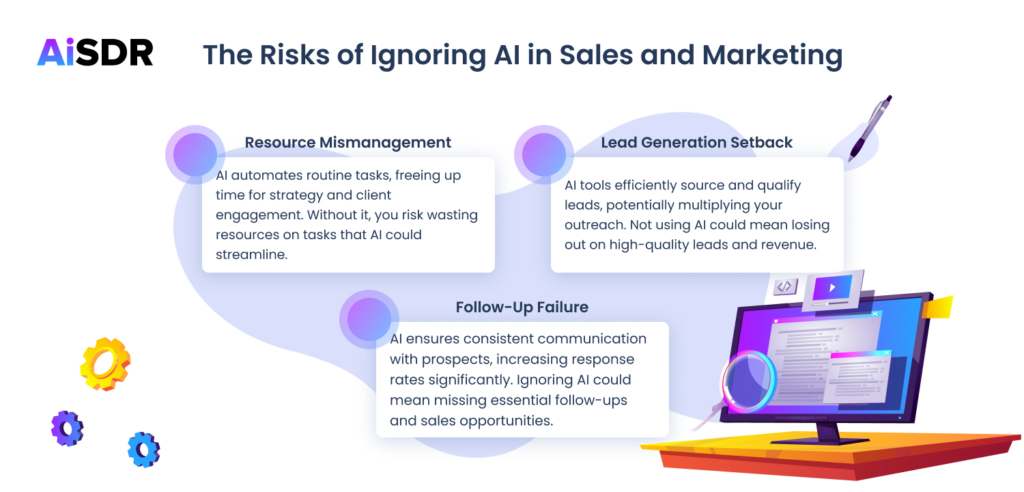
Apart from losing a competitive advantage, other consequences of ignoring artificial intelligence advances include:
- Inefficient resource allocation: AI speeds up most routine tasks that don’t require a high level of focus. It saves time by helping develop a strategy, communicate with clients, and create valuable content.
- Missed opportunities for lead generation: Certain AI sales prospecting tools can research potential leads through numerous channels, validate the leads, segment them into categories for more targeted offers, and automate lead outreach efforts. Instead of manually contacting ten leads per week, you use a dedicated AI product to find and contact 100 higher-quality leads.
- Inconsistent or lack of follow-up: It might not be easy to keep up with high volumes of emails while also staying on top of numerous other sales tasks. Missing follow-ups can lead to losing prospects. Just one follow-up increases the response rate by 40% compared to the first contact, so why not improve your chance of making a sale with a powerful AI and sales combination?
AI brings innumerable benefits to sales and marketing teams. Adopting AI tools makes your teams more productive, allows them to conserve resources by reducing work on routine tasks, and helps them provide the best customer service possible.
How will AI improve in the future?
AI intelligence grows exponentially year by year, thanks to both its self-learning capabilities and scientists. That’s not to say we’ll see robots aiming to take over. Moving from imagination to reality, here is where AI progress will happen.
Viral content prediction
Media posts can spin out of control for brands. When footballer Jadon Sancho missed the World Cup lineup, RyanAir tweeted, offering him a flight anyway. The backlash from fans quickly followed, sparking a PR crisis.
Soon, though, AI can help detect content that will go viral. And who knows? Maybe AI will even be capable of modeling worst-case public reactions, playing out scandals before you publish a post.
Psychographic segmentation
Traditional buyer personas and ideal customer profiles in marketing and sales rely heavily on superficial parameters like age, gender, location, job title, etc.
We can already see enhanced AI solutions that uncover what influences customer decisions — values, motivations, and beliefs. These tools scan social posts, reviews, forums, and sales calls. Using natural language processing, they analyze all the data to reveal the hidden psychology driving buyers’ decisions.
Adapting to machine assistants
By 2027, nearly half of people in developed countries will use AI personal assistants to do shopping for them. There’s no better way for sales and marketing teams than to fight fire with fire and use AI to adjust to this trend. AI tools for sales and marketing teams can help by automating the optimization of product specs or pricing on sites for machine reading.
The rise of ethical AI
As AI spreads, more ethical worries come up on how AI impacts users. Lawmakers develop guidelines for accountable AI software development. But with thoughtful progress, we can welcome AI solutions that will be able to resist these challenges, so you don’t have to quit AI usage.
While biases exist now, innovations in training data, localized learning, and neural network techniques actively reduce prejudice.
AI holds immense promise for solving marketing and sales tasks. What seems impossible to automate is becoming more than real thanks to AI’s future potential.
Start using AI to reduce your teams’ workload today
With today’s tech, you have easier ways to get work done. Companies can’t simply ignore the advances. Whichever business provides the best service quickest will beat the competition. Introducing artificial intelligence is a great way to achieve this result.
From creating unique social media content to speeding up email marketing campaign planning with AI tools for nurturing leads, GenAI marketing helps businesses of all sizes stay ahead.
If you’re unsure where to start your AI journey, AiSDR is an easy-to-use, plug-and-play AI for start-ups and teams looking to scale their outreach without overinflating their budget.
Book a demo to learn more about how AiSDR can benefit your team.
FAQ
Is generative AI relevant for small businesses?
Yes, generative AI is a great tool for small businesses operating on a restricted budget to improve their sales and marketing efforts. Small sales and marketing teams looking to automate all kinds of marketing tasks and generate high-quality content can use GenAI for a lower cost than hiring more team members.
How does AI improve the customer journey?
A dedicated sales AI tool can support your prospects and customers at any point in their journey while reducing the demand on your sales and marketing teams. AI for sales enablement can analyze customer data to automate the customer journey using more targeted content and offers. It can make interactions more personalized, send immediate emails and chat replies, automate demo booking, and provide real-time support 24/7 via chatbots.
Is AI practical for diverse marketing channels?
Artificial intelligence and marketing pair well for various channels, including email marketing, social media, website blogs, and more.
How does AI aid in customer retention?
Conversational AI for sales can significantly improve the quality of customer service through enhanced personalization and timely follow-ups. It helps you increase customer satisfaction, which motivates customers to stay with your company.

